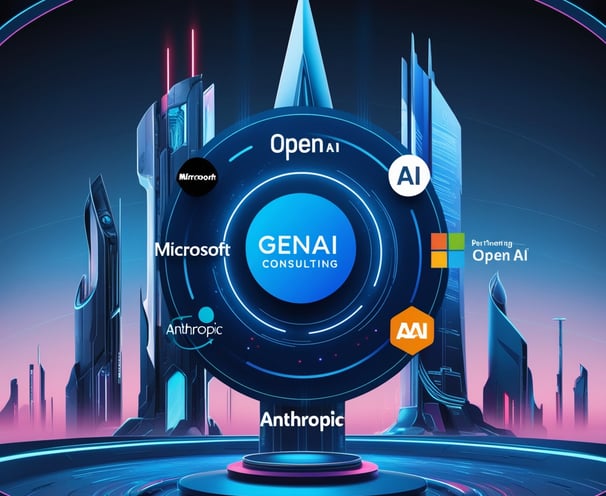AI Readiness Assessment: Are You Ready to Transform Your Business?
Discover why an AI Readiness Assessment is the critical first step to overcoming challenges like fragmented data, lack of training, and outdated systems—and how it can set your organization up for AI success.
Joanne Lin
1/28/20257 min read


In today’s rapidly evolving business landscape, the question isn’t whether to adopt AI or not, but how ready is your organization is to do so. For many enterprises, the journey toward AI integration is filled with obstacles: limited organizational innovation, insufficient employee training, fragmented data ecosystems, and a lack of unified hardware and software systems. These challenges underscore the importance of conducting an AI Readiness Assessment—the critical first step in embracing AI technologies like large language models and generative AI tools.
Being “AI ready” goes far beyond simply having the right tools or infrastructure in place. It requires a comprehensive data ecosystem built on strong governance, seamless data integration, and robust modeling capabilities. Many organizations underestimate the depth of preparation required, often focusing on surface-level capabilities while neglecting the underlying systems that drive AI success. For businesses considering AI implementation, understanding your AI readiness is the critical first step to ensuring success.
This guide will help you navigate these challenges by exploring the key factors that define AI readiness, providing working steps based on industry standards, and offering actionable insights to ensure your business is prepared to harness the power of enterprise artificial intelligence. The question is: Are you ready to transform your business?
What is AI Readiness?
AI Readiness refers to an organization’s ability to effectively implement and leverage AI technologies to drive measurable outcomes. It involves having the right combination of technical infrastructure, accessible and high-quality data, skilled employees, and a strategic approach to AI adoption. Being ready for AI goes beyond technology; it’s about integrating AI into the company’s DNA.
AI readiness can typically be evaluated in four stages:
Learning: Exploring AI’s potential and understanding its implications for the business.
Scaling: Running pilot programs and expanding AI use across departments.
Differentiating: Using AI strategically to create competitive advantages.
Leading: Fully integrating AI into operations to drive innovation and set industry benchmarks.
Through the assessment, businesses can gain insight into the proportion of companies at the same stage of AI readiness and identify the key characteristics of this phase. These characteristics often encompass the robustness of technical infrastructure, the sophistication of data management practices, and the team’s proficiency with AI tools. More importantly, the evaluation helps organizations pinpoint critical areas for improvement to enhance their AI readiness. By identifying these areas, organizations gain targeted insights into what’s needed to enhance their AI readiness, whether it’s investing in better data systems, upskilling employees, or fostering leadership buy-in.
Why Does AI Readiness Matter?
Artificial intelligence isn’t just a passing trend; it’s the future of business. At its core, AI readiness is about an organization’s ability to adopt and leverage AI tools effectively. It’s not just about using AI tools—it’s about ensuring they are integrated seamlessly into the organization’s workflows, solving real business problems rather than becoming flashy yet underutilized investments. It requires more than just installing software—it’s about aligning technology, people, and processes to harness the transformative power of artificial intelligence. When done right, AI becomes a powerful enabler, streamlining operations, uncovering insights from data, and driving innovation across all levels of the organization.
AI Readiness as a Competitive Advantage
Companies that prioritize readiness to adopt AI position themselves as leaders in innovation. AI automates repetitive, time-consuming tasks like data analysis, reporting, and customer service processes, freeing employees to focus on creative, high-value work. This shift doesn’t just improve productivity; it inspires innovation. Imagine a team that spends less time generating reports and more time brainstorming solutions to complex challenges—this is the cultural shift that readiness for AI enables.
According to a recent study by Statista, 84% of global business organizations believe AI will provide them with a competitive advantage in the marketplace. Ultimately, conducting an AI readiness assessment has become a key element to staying competitive and driving innovation. Organizations that are prepared to scale AI adoption are better equipped to adapt to market demands, personalize customer experiences, and predict industry trends.
Better decision making and productivity
In an increasingly data-driven world, making the right decisions at the right time is vital. AI systems analyze vast amounts of data in real time, offering actionable insights that help businesses anticipate market trends and customer behaviors.
For example, AI tools can identify subtle shifts in consumer preferences, enabling companies to adjust their strategies before competitors catch on. Retailers like Amazon leverage AI to forecast demand, optimize inventory, and offer personalized recommendations, which drives higher customer satisfaction and loyalty. Businesses that invest in AI readiness can make smarter, faster decisions that directly impact their bottom line.
Sustained Growth and Scalability
Investing in AI readiness doesn’t just yield immediate returns—it sets the foundation for long-term success. Businesses with a solid AI strategy can scale their systems efficiently, keeping up with ever-evolving technologies and market demands.
Companies that establish a robust framework for AI adoption avoid the pitfalls of poorly planned implementations, such as resource waste or lackluster outcomes. A study by MIT Sloan Management Review (MIT SMR) and Boston Consulting Group highlights that companies with employees who derive individual value from AI are 5.9 times more likely to see significant financial benefits. This ensures that investments in AI not only pay off but continue to drive growth for years to come.
AI Integration Insights to unlock Smarter Operations
Preparing for AI integration offers a unique opportunity to rethink how operations are structured and optimized. AI readiness provides companies with insights into how best to integrate AI tools into existing workflows, ensuring seamless collaboration between AI systems and human teams.
For example, AI tools like chatbots and CRM integrations are transforming customer service by improving response times and delivering personalized interactions. Companies ready for AI integration experience smoother transitions, reduced disruptions, and quicker returns on their AI investments. By gaining insights into how to optimize AI integration, businesses can unlock smarter operations that drive efficiency and elevate their competitive standing.
The Cost of Not Being Ready is high
Failing to invest in AI readiness doesn’t just mean missed opportunities—it can leave companies struggling to keep up. By 2030, automation is expected to impact 30% of current work hours in the U.S. Companies unprepared for this shift risk inefficiency, higher labor costs, and a slower pace of innovation. A 2023 report from McKinsey has been shown to improve developer productivity by 200%, highlighting how readiness can directly impact ROI on labor investments.
Yet, many organizations underestimate what it takes to get ready for AI. A strong strategy isn’t just about implementing AI systems—it’s about building the infrastructure and workforce needed to support them. Without this preparation, businesses risk poorly executed AI projects that drain resources and fail to deliver value.
The challenge of adopting AI Readiness
Resistance to Change
One of the biggest barriers isn’t technology—it’s people. AI has the potential to transform how work is done, and that can make employees uneasy. Some may fear losing their jobs, while others might feel overwhelmed by the need to learn new skills. Overcoming this resistance requires a clear communication strategy that emphasizes how AI can make their work more efficient and meaningful. Providing training and support is equally essential to help employees adapt to these changes.
Therefore, executive buy-in is critical. Leaders must see AI as more than just a flashy tool for generating images or automating basic tasks. They need to understand its real value—automating repetitive processes, improving operational efficiency, and scaling throughput beyond human limits. When executives fully grasp these benefits, they can champion AI initiatives, secure necessary resources, and foster company-wide support.
Complexity of AI Technology
AI isn’t plug-and-play. Its complexity can be daunting, especially for organizations without in-house expertise. Advanced features require a steep learning curve for employees tasked with operating AI solutions. Businesses need to invest in upskilling their teams or partner with AI experts who can guide them through the intricacies of implementation.
Integration is another hurdle. AI vendors often have technical requirements that organizations must meet to ensure seamless adoption. This might involve upgrading software, purchasing new hardware, or overhauling existing systems. Without a clear integration roadmap, companies risk wasting time and resources.
Budget Constraints
AI adoption can be expensive, especially for small businesses. The costs of purchasing AI tools, hiring specialists, and upgrading infrastructure can quickly add up. To address this, organizations can start small—focus on low-cost, high-impact AI projects that demonstrate tangible results. As these initial efforts yield returns, companies can reinvest and scale their AI programs incrementally.
Ethical and Privacy Concerns
With the growing adoption of AI, concerns around ethics and data privacy have become more prominent. Companies need to navigate an evolving regulatory landscape while ensuring that their AI applications respect customer privacy and comply with legal requirements. Establishing clear ethical guidelines and adopting strong governance practices can help businesses mitigate these risks. Doing so not only protects the organization from legal repercussions but also builds trust with customers and stakeholders.
Security Threats
AI systems, particularly those handling sensitive data, are prime targets for cyberattacks. Threat actors could exploit vulnerabilities to manipulate AI models or steal valuable information. Companies must prioritize robust cybersecurity measures, including regular audits and monitoring, to safeguard their AI investments.
Optimizing AI Resource Management with GenAI
At GenAI, we focus on tailored solutions that align with your specific needs. Whether it’s creating a roadmap for scaling AI across your organization, optimizing existing resources, or guiding teams through implementation, our goal is to ensure that AI works seamlessly within your business framework.
If your organization is ready to embark on its AI journey, partnering with a trusted expert like GenAI ensures you receive tailored solutions designed to fit your unique business needs. From strategic planning to seamless integration and ongoing support, GenAI works alongside you to maximize the value of your AI investments and deliver measurable results.
About us
GENAI specialize in providing tailored AI solutions designed to align with your unique business goals. From conducting comprehensive AI Readiness Assessments to implementing seamless GenAI Framework Integration, we equip companies with the tools, strategies, and support they need to unlock AI’s full potential. Our services go beyond implementation, offering post-deployment assessments to ensure your AI investments deliver long-term value and efficiency.


Innovate
Empowering businesses through AI-driven solutions.
Transform
Become Future ready
© 2025. All rights reserved.
